Pressure Washing Springville
Find the best Pressure Washing in Springville
Receive 3 FREE Power Washing quotes for your project today! Compare profiles, reviews, accreditations, portfolio, etc... and choose the best offer.

Mountain West Pressure Washing
513 reviewsVineyard, UT, 123 Main St, 84059, USMountain West Pressure Washing is a Provo-based company that specializes in high-density housing and building washing services. Their goal is to improve the Provo community through their commercial pressure washing services. They understand the fact that they are in the service industry, and their team takes pride in this simple truth. Through the commercial pressure washing services they provide, they work their hardest to boost the business efforts of their clients. They are honored by the trust that their customers show in their skills and services. They honor that trust by providing the best pressure washing services in return.
- Services
- Why Us?
- Accreditations
- Our Team
- Testimonials
- Gallery
Get Quote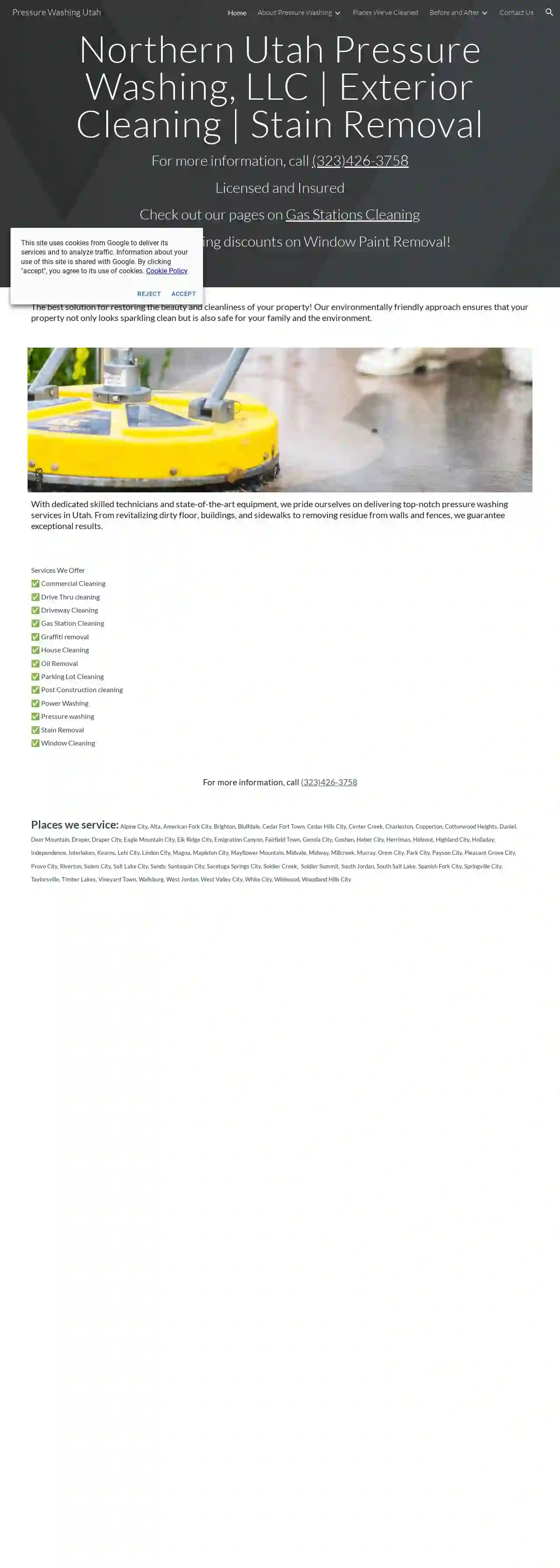
Northern Utah Pressure Washing
53 reviewsProvo, USNorthern Utah Pressure Washing, LLC is Utah's best option for commercial & residential pressure washing. Pressure washing is a top investment for your property. Clean and revitalize surfaces without costly renovations. Protect your exterior from damage caused by grime, mold, and mildew. Enhance curb appeal and extend the life of your surfaces with professional pressure washing services.
- Services
- Why Us?
- Gallery
Get Quote
AquaPro
5102 reviewsPleasant Grove, UT, AquaPro Company, 84062, USExperience why your neighbors in and around Salt Lake City choose AquaPro for all their window cleaning and exterior cleaning needs. Your home is one of the biggest investments that you will make. It’s important that you feel proud of it. Whether your windows are streaky, your home siding is dirty or your driveway is stained, all of these things impact how you feel about your home. At AquaPro, we are here to help ensure that you feel proud of your property. We provide professional window cleaning, house washing, gutter cleaning and more so that you not only feel proud as you pull up on your driveway, but you can spend time doing things with those that matter most.
- Services
- Why Us?
- Testimonials
- Gallery
Get Quote
Purity Cleaning
4.9157 reviewsProvo, Utah, 470 South University Ave, 84601, USPurity Cleaning Systems is a family-owned and operated business with over 30 years of experience in the industry. They offer a variety of services including window cleaning, gutter cleaning, Christmas light installation, carpet cleaning, power washing, and solar panel cleaning. Their team of expert window cleaners has the tools and know-how to achieve that perfect, streak-free shine every time. They also meticulously clean screens and remove all the hidden gunk from the tracks, ensuring every part of your window is spotless. Purity Cleaning Systems is committed to providing clear communication, community first, and a 72-hour rain guarantee.
- Services
- Why Us?
- Accreditations
- Our Team
- Testimonials
- Gallery
Get Quote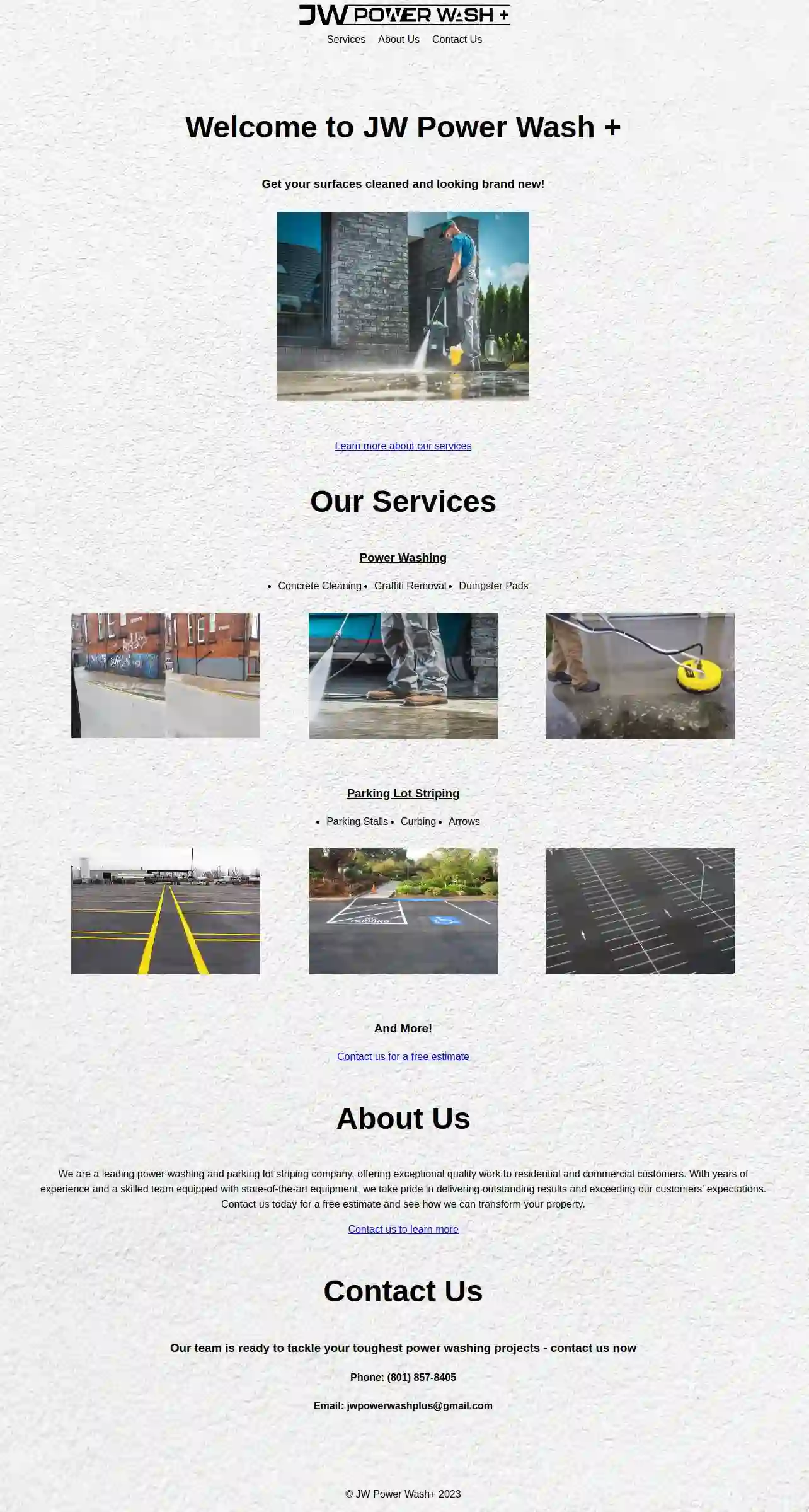
JW Power Wash Plus
53 reviewsProvo, USJW Power Wash+ is a leading power washing and parking lot striping company dedicated to providing exceptional quality work to both residential and commercial clients. With years of experience and a skilled team utilizing state-of-the-art equipment, we pride ourselves on delivering outstanding results and exceeding customer expectations. Contact us today for a free estimate and discover how we can transform your property.
- Services
- Why Us?
- Gallery
Get Quote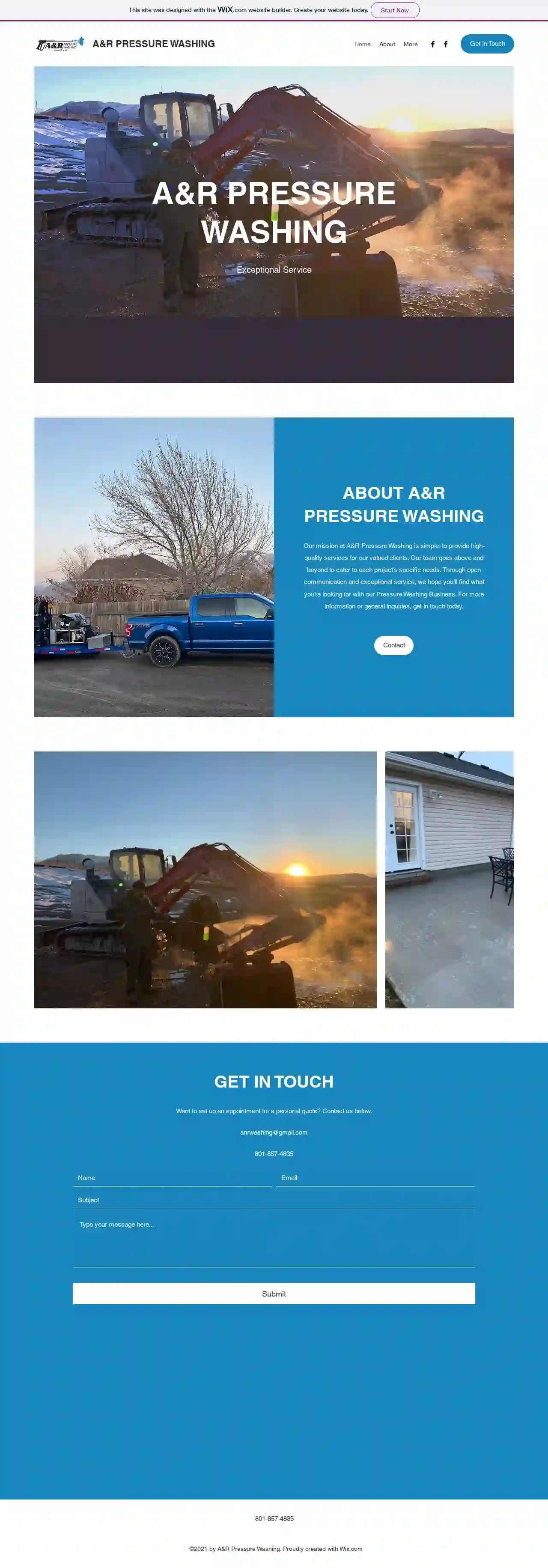
A&R Pressure Washing
54 reviewsProvo, USOur mission at A&R Pressure Washing is simple: to provide high-quality services for our valued clients. Our team goes above and beyond to cater to each project’s specific needs. Through open communication and exceptional service, we hope you’ll find what you’re looking for with our Pressure Washing Business. For more information or general inquiries, get in touch today.
- Services
- Why Us?
- Gallery
Get Quote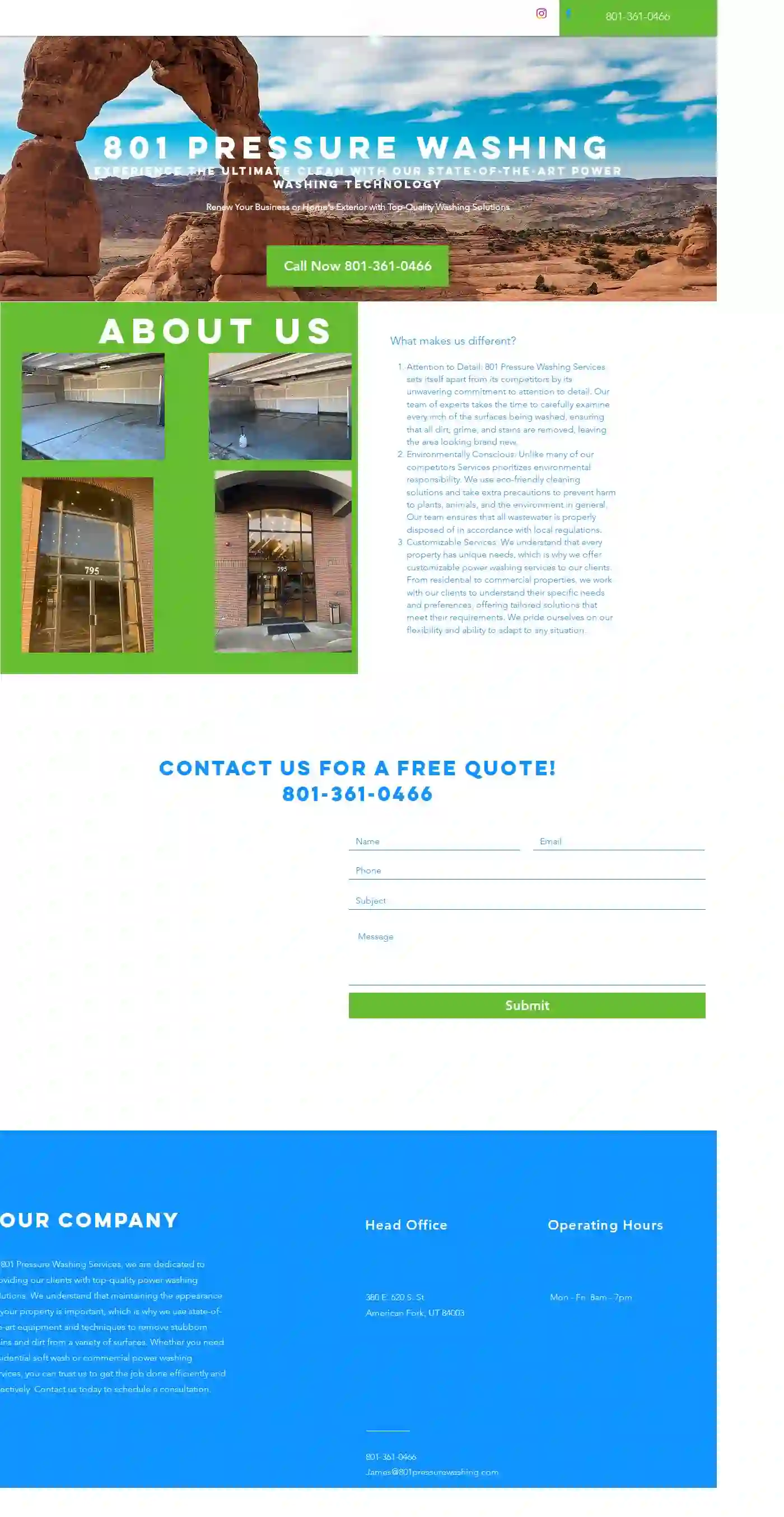
801 Pressure Washing
380 E. 620 S. St, American Fork, 84003, US801 Pressure Washing Services is dedicated to providing top-quality power washing solutions for both residential and commercial properties. We understand the importance of maintaining your property's appearance and utilize state-of-the-art equipment and techniques to effectively remove stubborn stains and dirt from a variety of surfaces. Our commitment to excellence sets us apart. We prioritize attention to detail, ensuring every inch is meticulously cleaned. We are also environmentally conscious, using eco-friendly cleaning solutions and responsible disposal practices. We believe in offering customizable services to meet each client's unique needs. Whether you require residential soft wash or commercial power washing, our team is here to deliver efficient and effective results. Contact us today to schedule a consultation and experience the ultimate clean!
- Services
- Why Us?
- Our Team
- Gallery
Get Quote
Rinse Cleaning
4.9306 reviews123 Main Street, San Diego, 92101, USRinsecleaning is a family owned and operated business serving the greater San Diego area. We are committed to providing our clients with the highest quality cleaning services at competitive prices. Our team of experienced and professional cleaners is dedicated to exceeding your expectations. We offer a wide range of services, including residential and commercial cleaning, as well as specialized services such as carpet cleaning and window cleaning. We use only the best cleaning products and equipment to ensure that your home or business is sparkling clean. We are fully insured and bonded, so you can rest assured that your property is in good hands. We are committed to providing our clients with exceptional service and value. Contact us today for a free estimate.
- Services
- Why Us?
Get Quote
Faber Curb Appeal
53 reviewsProvo, USFaber Curb Appeal is a locally-owned and family-operated garbage can cleaning business serving Utah County. We believe a well-maintained lawn is a reflection of pride in your home or business. Our passion for creating lush, vibrant landscapes has made us a leading lawn maintenance company. We specialize in a range of services, including lawn maintenance, pressure washing, landscaping, and sprinkler repair. We are dedicated to excellence and transforming your outdoor space into a masterpiece. Our services include mowing, edging, trimming, fertilization, weed control, and aeration. We also offer professional pressure washing services for driveways, walkways, decks, patios, siding, roofs, and more. Our landscaping experts can design and implement a landscape that suits your preferences and enhances your property's beauty. We also provide sprinkler repair and maintenance services to ensure your system operates efficiently. We are committed to customer satisfaction and offer professional-grade lawn maintenance services, including snow plowing, snow removal, window cleaning, aerating, tree removal, and more. Our innovative work and reasonable pricing keep our customers coming back.
- Services
- Why Us?
- Gallery
Get Quote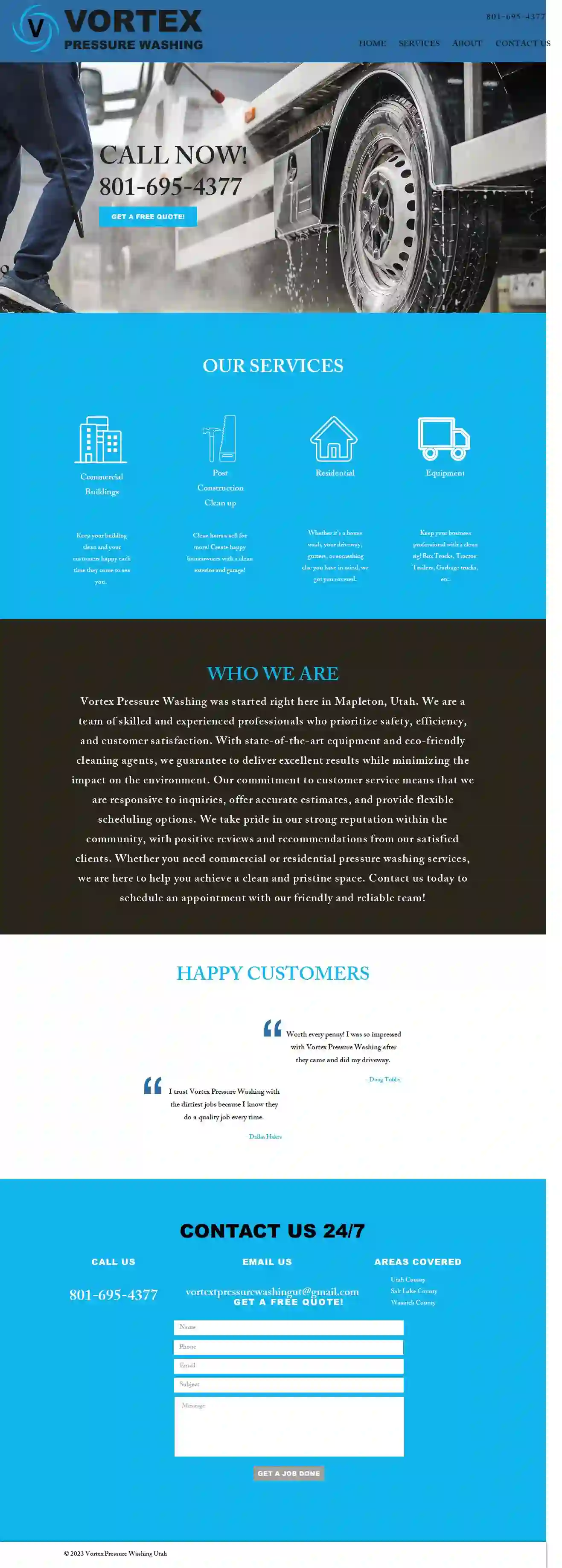
Vortex Pressure Washing
511 reviewsProvo, USVortex Pressure Washing was started right here in Mapleton, Utah. We are a team of skilled and experienced professionals who prioritize safety, efficiency, and customer satisfaction. With state-of-the-art equipment and eco-friendly cleaning agents, we guarantee to deliver excellent results while minimizing the impact on the environment. Our commitment to customer service means that we are responsive to inquiries, offer accurate estimates, and provide flexible scheduling options. We take pride in our strong reputation within the community, with positive reviews and recommendations from our satisfied clients. Whether you need commercial or residential pressure washing services, we are here to help you achieve a clean and pristine space. Contact us today to schedule an appointment with our friendly and reliable team!
- Services
- Why Us?
- Testimonials
- Gallery
Get Quote
Over 60,241+ Janitorial Services registered
Our janitorial contractors operate in Springville & beyond!
CleaningMatch has curated and vetted the Best Cleaning Companies near Springville. Find a reliable business today.
Frequently Asked Questions About Pressure Washing
- Size of the Area: Larger areas generally cost more to pressure wash than smaller ones.
- Type of Surface: Different surfaces require different pressure levels and cleaning solutions, which can affect pricing.
- Condition of the Surface: Heavily soiled or stained surfaces may require more time and effort to clean, impacting cost.
- Accessibility: Difficult-to-reach areas may require specialized equipment and increase costs.
- Additional Services: Services like pre-treating stains, applying protective coatings, or mold removal may incur additional charges.
- 0-degree Nozzle: Produces a highly concentrated, powerful jet of water for removing stubborn stains or stripping paint. Use with caution as it can damage surfaces easily.
- 15-degree Nozzle: A versatile nozzle for cleaning concrete, brick, and other hard surfaces. Provides a good balance of pressure and coverage.
- 25-degree Nozzle: A wider spray pattern for cleaning delicate surfaces like siding or fences.
- 40-degree Nozzle: A very wide spray pattern, ideal for rinsing or applying cleaning solutions.
- Soap Nozzle: A low-pressure nozzle designed specifically for applying cleaning solutions.
- Rotary Nozzle: Also known as a turbo nozzle, it produces a rotating, high-impact spray for tackling tough stains and grime.
- Experience and Expertise: Professionals have the knowledge and skills to choose the right pressure levels and cleaning solutions for different surfaces, minimizing the risk of damage.
- Professional Equipment: Pressure washing companies use commercial-grade equipment that is more powerful and efficient than consumer-grade pressure washers.
- Safety: Pressure washing can be hazardous, especially when working on ladders or with high-pressure water. Professionals are trained in safety procedures and have the necessary equipment to work safely.
- Time-Saving: Pressure washing can be time-consuming, especially for larger projects. Hiring professionals frees up your time for other tasks.
- Regular Cleaning: Sweep or rinse surfaces regularly to prevent dirt and grime from building up.
- Address Stains Promptly: Clean up spills or stains as soon as possible to prevent them from setting in.
- Trim Vegetation: Keep trees and shrubs trimmed away from surfaces to minimize shade, which can promote mold and mildew growth.
- Apply Protective Coatings: Consider applying protective sealants or coatings to surfaces like decks or fences to repel water and dirt, extending their lifespan and maintaining their appearance.
- Schedule Periodic Pressure Washing: Schedule periodic professional pressure washing to maintain the cleanliness and appearance of your surfaces over time.
How much does pressure washing cost?
To get accurate pricing, request quotes from multiple pressure washing companies. Provide details about the size and type of surface, its condition, and any additional services you require.
What are the different types of pressure washer nozzles?
Choose the appropriate nozzle based on the cleaning task and the type of surface being cleaned. Consult the pressure washer manual or a professional pressure washer for guidance.
Can I pressure wash my own house?
If you're considering DIY pressure washing, assess the complexity of the project, your experience, and the risks involved. For larger or more challenging projects, hiring professionals is often a wiser and safer choice.
What are some tips for maintaining my pressure washed surfaces?
By implementing these maintenance practices, you can prolong the results of your pressure washing and keep your surfaces looking their best.
How much does pressure washing cost?
- Size of the Area: Larger areas generally cost more to pressure wash than smaller ones.
- Type of Surface: Different surfaces require different pressure levels and cleaning solutions, which can affect pricing.
- Condition of the Surface: Heavily soiled or stained surfaces may require more time and effort to clean, impacting cost.
- Accessibility: Difficult-to-reach areas may require specialized equipment and increase costs.
- Additional Services: Services like pre-treating stains, applying protective coatings, or mold removal may incur additional charges.
To get accurate pricing, request quotes from multiple pressure washing companies. Provide details about the size and type of surface, its condition, and any additional services you require.
What are the different types of pressure washer nozzles?
- 0-degree Nozzle: Produces a highly concentrated, powerful jet of water for removing stubborn stains or stripping paint. Use with caution as it can damage surfaces easily.
- 15-degree Nozzle: A versatile nozzle for cleaning concrete, brick, and other hard surfaces. Provides a good balance of pressure and coverage.
- 25-degree Nozzle: A wider spray pattern for cleaning delicate surfaces like siding or fences.
- 40-degree Nozzle: A very wide spray pattern, ideal for rinsing or applying cleaning solutions.
- Soap Nozzle: A low-pressure nozzle designed specifically for applying cleaning solutions.
- Rotary Nozzle: Also known as a turbo nozzle, it produces a rotating, high-impact spray for tackling tough stains and grime.
Choose the appropriate nozzle based on the cleaning task and the type of surface being cleaned. Consult the pressure washer manual or a professional pressure washer for guidance.
Can I pressure wash my own house?
- Experience and Expertise: Professionals have the knowledge and skills to choose the right pressure levels and cleaning solutions for different surfaces, minimizing the risk of damage.
- Professional Equipment: Pressure washing companies use commercial-grade equipment that is more powerful and efficient than consumer-grade pressure washers.
- Safety: Pressure washing can be hazardous, especially when working on ladders or with high-pressure water. Professionals are trained in safety procedures and have the necessary equipment to work safely.
- Time-Saving: Pressure washing can be time-consuming, especially for larger projects. Hiring professionals frees up your time for other tasks.
If you're considering DIY pressure washing, assess the complexity of the project, your experience, and the risks involved. For larger or more challenging projects, hiring professionals is often a wiser and safer choice.
What are some tips for maintaining my pressure washed surfaces?
- Regular Cleaning: Sweep or rinse surfaces regularly to prevent dirt and grime from building up.
- Address Stains Promptly: Clean up spills or stains as soon as possible to prevent them from setting in.
- Trim Vegetation: Keep trees and shrubs trimmed away from surfaces to minimize shade, which can promote mold and mildew growth.
- Apply Protective Coatings: Consider applying protective sealants or coatings to surfaces like decks or fences to repel water and dirt, extending their lifespan and maintaining their appearance.
- Schedule Periodic Pressure Washing: Schedule periodic professional pressure washing to maintain the cleanliness and appearance of your surfaces over time.
By implementing these maintenance practices, you can prolong the results of your pressure washing and keep your surfaces looking their best.